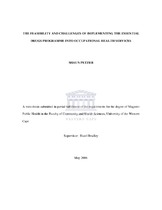| dc.contributor.advisor | Bradley, Hazel | |
| dc.contributor.author | Petzer, Shaun | |
| dc.contributor.other | School of Public Health | |
| dc.contributor.other | Faculty of Community and Health Sciences | |
| dc.date.accessioned | 2013-06-19T07:05:32Z | |
| dc.date.available | 2007/04/20 10:41 | |
| dc.date.available | 2009/06/23 | |
| dc.date.available | 2013-06-19T07:05:32Z | |
| dc.date.issued | 2006 | |
| dc.identifier.uri | http://hdl.handle.net/11394/1478 | |
| dc.description | Magister Public Health - MPH | en_US |
| dc.description.abstract | The Essential Drugs Programme (EDP) is one of the tools developed to achieve the objectives of the South African National Drug Policy. Occupational health (OH) services are largely in the private sector and usually provide an element of Primary Health Care in addition to Occupational Hygiene, Medicine and Nursing. The aim of this study was to determine the challenges of implementing the Essential Drugs Programme into Occupatinal Health settings in the Port Elizabeth and East London areas. A descriptive cross-sectional study was carried out. Respondents cited the evidence-based approach to management of clients as a motivating factor for adopting the EDP in Occupational Health clinics. | en_US |
| dc.language.iso | en | en_US |
| dc.publisher | University of the Western Cape | en_US |
| dc.subject | Occupational health services | en_US |
| dc.subject | South African National Drug Policy | en_US |
| dc.title | The feasibility and challenges of implementing the essential drugs programme into occupational health services | en_US |
| dc.type | Thesis | en_US |
| dc.rights.holder | University of the Western Cape | en_US |
| dc.description.country | South Africa | |

